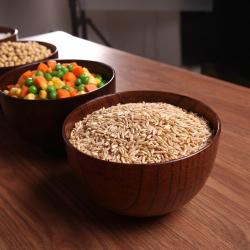How to Cook for Optimal Gut Health and Digestion
In recent years, the spotlight on gut health has intensified, shedding light on its critical role in overall well-being. A healthy gut contributes to improved digestion, nutrient absorption, and even mental health. With so much at stake, understanding how to cook for optimal gut health is invaluable. Here’s a guide to cooking meals that nourish your digestive system.
Understanding Gut Health
The gut is home to trillions of microorganisms, known as the gut microbiota, that play vital roles in digestion, immune function, and protection against harmful bacteria. Maintaining a balanced gut microbiome is essential for overall health. Factors such as diet, stress, and antibiotics can disrupt this balance, leading to digestive issues and beyond. Fortunately, diet is a powerful tool to nurture gut health.
Key Nutrients for Gut Health
-
Fiber: Essential for digestive health, fiber supports regular bowel movements and feeds beneficial gut bacteria. Foods rich in fiber include fruits, vegetables, whole grains, legumes, nuts, and seeds.
-
Probiotics: These are live bacteria that replenish beneficial gut bacteria. Probiotics are found in fermented foods like yogurt, kefir, sauerkraut, kimchi, and miso.
-
Prebiotics: As food for probiotics, prebiotics help maintain a healthy gut environment. They're abundant in foods such as garlic, onions, leeks, asparagus, and bananas.
-
Polyphenols: Plant compounds that can promote the growth of beneficial gut bacteria. Sources include berries, green tea, dark chocolate, and red wine (in moderation).
-
Omega-3 Fatty Acids: These support gut health by reducing inflammation. Rich sources are flaxseeds, walnuts, and fatty fish like salmon.
Cooking Tips for Optimal Gut Health
-
Prioritize Whole Foods: Opt for unprocessed, whole foods wherever possible. Processing often strips foods of essential nutrients and fiber.
-
Embrace Fermentation: Fermentation not only preserves foods but also enhances their probiotic content. Experiment with homemade yogurt, kimchi, or kombucha.
-
Balance Your Plate: Include a variety of food groups to ensure a broad spectrum of nutrients that support a healthy gut microbiome.
-
Mindful Cooking Methods: Opt for steaming, boiling, or baking over frying to preserve nutrient content and avoid unhealthy fats.
-
Stay Hydrated: Adequate hydration is critical for digestion. Drinking water helps dissolve fats and soluble fiber, allowing food to pass through the intestines more efficiently.
-
Add Herbs and Spices: Many have anti-inflammatory properties beneficial for gut health. Ginger, turmeric, and peppermint are excellent choices.
-
Limit Sugar and Artificial Sweeteners: Excessive sugar can disrupt the balance of bacteria in your gut. Instead, use natural sweeteners like honey or maple syrup in moderation.
Sample Recipe: Gut-Friendly Vegetable Stir-Fry
Ingredients:
- 1 tablespoon olive oil
- 2 cloves garlic, minced
- 1 tablespoon ginger, grated
- 1 cup broccoli florets
- 1 cup sliced bell peppers
- 1 cup shredded carrots
- 1 cup snap peas
- 2 tablespoons tamari or soy sauce
- 1 tablespoon apple cider vinegar
- 1 tablespoon sesame seeds
- Fresh cilantro, chopped for garnish
Instructions:
- Heat olive oil in a large pan over medium heat. Add garlic and ginger, sautéing until fragrant.
- Add broccoli, bell peppers, carrots, and snap peas. Stir-fry for 5-7 minutes until vegetables are tender-crisp.
- Stir in tamari and apple cider vinegar, cooking for an additional 2 minutes.
- Sprinkle with sesame seeds and garnish with cilantro before serving.
Conclusion
Prioritizing gut health involves thoughtful choices about what we cook and eat. By selecting foods rich in fiber, probiotics, and other gut-friendly nutrients, and being mindful of cooking methods, you can create delicious meals that support a healthy digestive system. Remember, small dietary shifts can lead to significant improvements in your gut health and overall well-being.
References
For more information on the topics discussed, consider exploring resources from reputable health organizations and scientific studies on gut health.






















